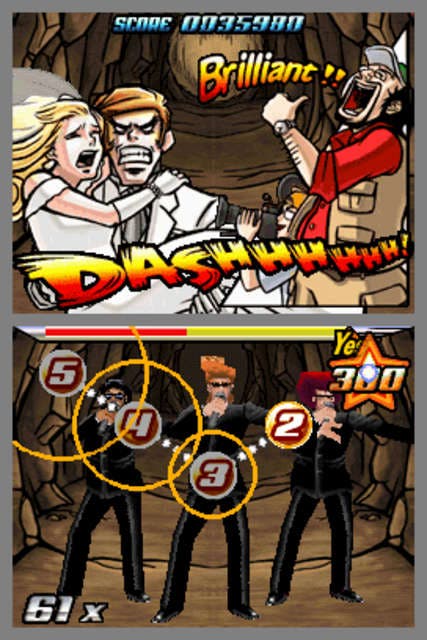Elite Beat Agents
Osu!
Often when it comes to assessing the cross-Pacific paddle of a treasured Japanese videogame - particularly something of a musical bent - it's a case for us of bemoaning the inevitable infusion of Western cultural icons. Like Avril Lavigne. Worse, you're forced to note that even lifeless, incomprehensible babble in another language, or happy cartoon scrawls with outsized heads and mental flapping arms, sweep you along on waves of sympathy far greater than any of those inspired by the phoned-in nonsense scraped from the reels of an LA recording booth, or squeezed from the underpaid pencil of whichever intern's borrowing the "artist" credit that morning.
But in the case of Elite Beat Agents - the Western reinvention of cult sensation Osu! Tatakae! Ouendan - there's no need. After all, thanks to the DS' multi-region sympathies, you can simply play through Ouendan in Japanese, as we're so fond of pointing out, and indeed any inexplicability there only adds to the fun. Elite Beat Agents is merely a second serving for people who don't do imports. At least, that's the theory - but, as we discovered when we danced through it earlier this month, the biggest surprise is that you can happily own and love both. EBA is just as ace.
Rather like Harmonix' rhythm-action games FreQuency and Amplitude, and even Guitar Hero, neither Ouendan or EBA really owes its brilliance to the specific music. You may snottily declare that it's Asian Kung-Fu Generation and Yaida Hitomi or nothing for you, but those of a slightly more open mind will discover that levels featuring Madonna's Material Girl, and Jumpin' Jack Flash, are every bit as good. Even the awful Lavigne is palatable and - I'm not even sure my Word processor will accept these words - Cher's Believe is surprisingly playable.
But let's start again, because most of you won't have played Ouendan, however essential we think it is. Both games work like this: as music plays, your job is to tap circular icons that appear on-screen in time to the beat. These icons are numbered and coloured, so you always know which to tap next. As for when to tap them, each circle is surrounded by a second outlined circle, which is shrinking - when it overlaps the boundary of the numbered circle, that's the time to strike. As you'll soon realise, you usually need to tap several circles in quick succession, and each tap is tailored to match a particular beat. To help underscore its involvement in the piece, a particular sound is given off - along with a points bonus - depending on how well-timed your strike is. Variations on the above include circles with multiple outlines (for tapping more than once), circles set in a coloured trail that snakes around the screen (which move off when you tap them, with the idea being to keep your stylus in contact with them as they go), and LPs that appears on-screen at the end of a sequence (where the idea is to madly rotate them).

As you play, missing too many beats completely and falling out of sequence reduces a top-of-the-screen meter to zero, at which point it's Game Over and you need to begin again. Conversely, a talented beat agent will be able to string long combos together, which amplifies the score - with a multiplier number constantly sat in the bottom left or right of the screen, depending on the option you choose in the menus.
And that's the whole game. Everything else that makes it essential is to be found outside the mechanics. Most importantly, there's the difficulty curve, and how it evolves the combinations satisfyingly. Initially more preoccupied with timing, you won't appreciate the genius of the concept so much, but by the time you do you'll be having your stylus dragged this way and that and following obediently. It's never random. Patterns emerge to match phrases in the music, much as they do in Harmonix' titles, and you start to record these in your brain, whipping them out almost instinctively. Slight modifications hold your attention, but your mind is freed to concentrate on new phrases. Extensive play - and the compulsion is such that there really is no other sort - delivers you into the sort of mental state where your fingers act faster than your brain. This is particularly acute on the harder difficulty, unlocked once you polish off normal, where level design is very different (and like the Japanese version, this rejuvenation certainly adds to the game's long-term appeal).
There are crutches to lean on if you struggle, though. A "review" button allows you to watch a replay of your attempt and pinpoint where you went wrong. Sometimes it's a case of learning the sequences by rote, although thankfully not too often. There's also a lower skill setting for anybody who has difficulty adjusting to normal straight away. A detailed rundown of how many notes you missed, how many "elite" notes you managed and so on is offered after each level, too, along with a facility to save off replay data to amuse your friends. Or yourself. Depending on how much you enjoy reviewing your own success (I tend to give mine 3/10).

Keen-eyed readers will have spotted a gap in the above-phrased eulogical ramblings, of course - the early frustration, the stumbling steps. But these are justified ten bazillion times over by the game's superb sense of humour. Like the Japanese, little comic strips unfold panel by panel prior to each level, setting up the scenario. EBA is no sterile song matrix - the eponymous songsmiths are called in to help citizens out of sticky situations "through the medium of dance". The comics set up each sequence as the song starts to roll. Perhaps it's a babysitter who wants to "go steady" with her American-football-loving boyfriend, but who can't find an opportunity to tell him, or perhaps it's a taxi driver who can't help speeding and getting caught. The EBA sort things out.
Yes it sounds silly, but you're used to silly (if not, welcome to Eurogamer). The principal concern among Ouendan fans was that these sequences would lose their appeal once translated. More than the introduction of stupid angst-rock, we feared the loss of the beat squad's daft antics. Without them, the game was dead - another homogenised Western licence-fest. Fortunately, it hasn't gone that way. We were so sceptical that it took a few levels to convince us (not helped by the abovementioned babysitting/steady claptrap), but by the time you're helping giddy bimbos to feed themselves by seducing lions and bears on a desert island - all the while you're humming and tapping Material Girl in the background - the effect is restored. Then it's off to fight a virus in the bowels of a sprinter by taking on the guise of an outrageously skirted nurse with a giant syringe. It certainly does the wacky with authentic aplomb, even if the cries of "Heeeeeaaaaaalp!" from the ailing public are less iconic than Japan's "Ooooou-eenn-daaaaaan!"
Perhaps the biggest challenge the Western version faced though was recreating Ouendan's surprisingly heart-wrenching "Over the Distance" level. It's obvious when EBA's equivalent arrives, and initially it's hard not to mock: It's Christmas. Listen, honey - Daddy's not coming home. I know he said he was but, but... he was in an accident. (In a hooker, more like.) But once it gets into its rhythm, even this is acceptable. Almost. The little girl is very arresting. Which is probably not something you're allowed to write on the Internet. What's more, the game's finale is superb, with a double-header boss battle that brings together the whole cast to face off an alien threat. It's hard not to like a game whose principal baddies are geometrically interesting floating eyes called "rhombulans".
Overall, sure, Elite Beat Agents has trouble making the same impact as the unexpected brilliance of Ouendan, but it does a miraculous job of avoiding the constraints of the culture it arrives in, and infuses the player with the same borderline prescience of tap-judgement that rendered the original's level design so inspired. It even cleans up a few quirks along the way. The multiplayer options (single- or multi-card), along with rumble pak support, merely add some soothing background melodies. And so where we'd expected to disapprove of EBA for messing with a formula, instead we're in the welcome position of being able to recommend Ouendan fans pick it up - you'll be surprised - as well as insisting that DS owners oblivious to the previous phenomenon either get the US version of hang about for the European release this summer. OSU!








